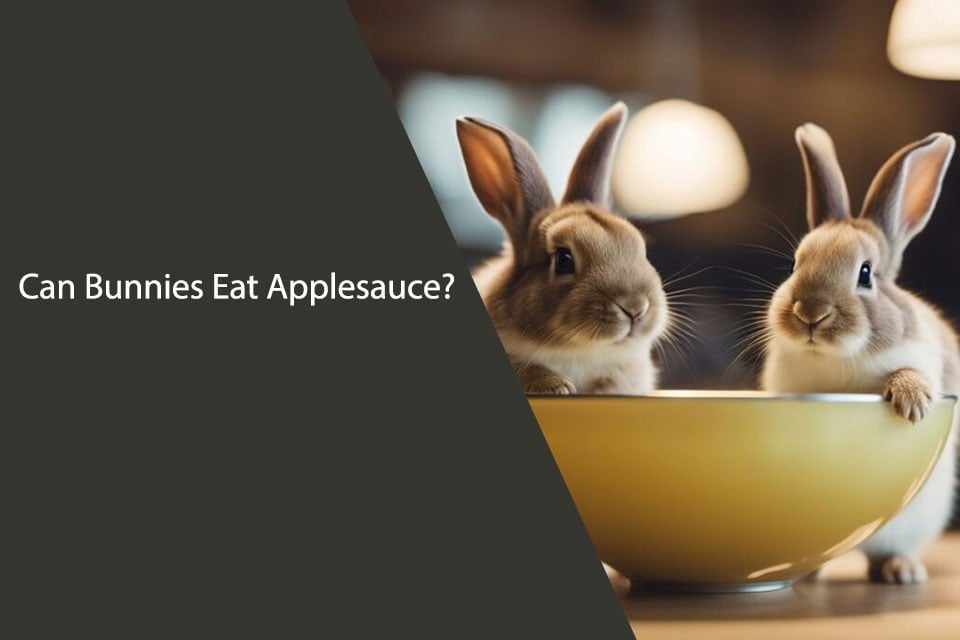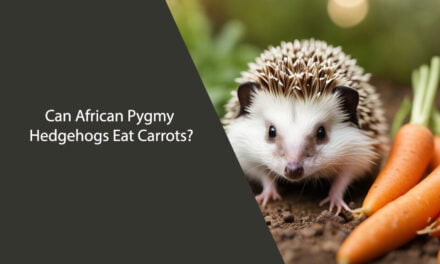Bunnies are cute and cuddly creatures that make great pets. As responsible pet owners, it’s important to ensure that our furry friends are getting the right nutrition to stay healthy and happy. With so many different types of food available, it’s natural to wonder what is safe for bunnies to eat. One common question that comes up is whether bunnies can eat applesauce.
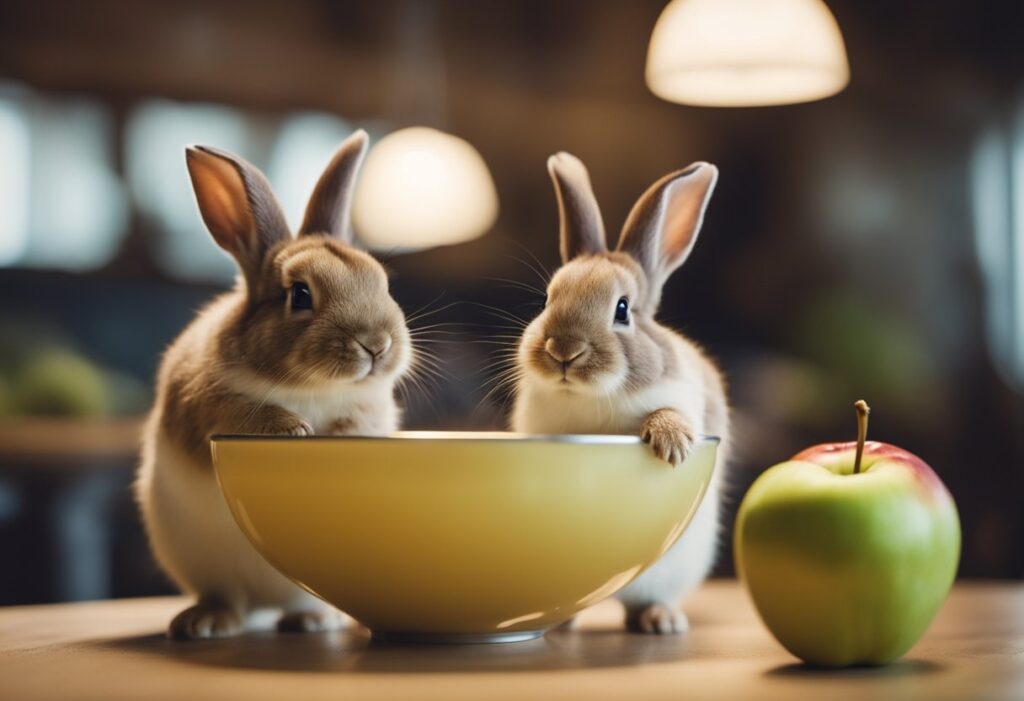
Applesauce is a popular snack for humans, but is it safe for bunnies? The answer is not a straightforward yes or no. While applesauce itself is not toxic to bunnies, it’s important to consider the ingredients and nutritional content. Many store-bought applesauce brands contain added sugars and preservatives that can be harmful to bunnies. Additionally, bunnies have sensitive digestive systems and too much sugar can cause gastrointestinal issues. It’s important to read the label carefully and avoid any applesauce that contains added sugars or other harmful ingredients.
If you want to give your bunny a treat of applesauce, it’s best to make your own at home. This way, you can control the ingredients and ensure that it’s safe for your bunny to eat. Simply peel and core a fresh apple, then cook it in a small amount of water until it’s soft. Mash the apple with a fork or blend it in a food processor to create a smooth consistency. You can offer a small amount of this homemade applesauce as a treat for your bunny, but be sure to limit it to a small amount and only offer it occasionally.
Table of Contents
Bunny Diet Fundamentals

When it comes to feeding our beloved bunnies, it’s important to understand their nutritional needs and what foods are safe for them to eat. In this section, we’ll cover the basics of a bunny’s diet and discuss the risks of processed foods.
Nutritional Needs of Rabbits
Rabbits are herbivores, which means they need a diet that is rich in fiber, vitamins, and minerals. A diet that is high in fiber will help keep their digestive system healthy and prevent issues like diarrhea and bloating. Some of the best foods to feed your bunny include hay, fresh vegetables, and a small amount of fruit.
Hay should make up the majority of your bunny’s diet. It’s a great source of fiber and helps keep their teeth healthy by wearing them down as they chew. Fresh vegetables like kale, spinach, and carrots are also great for bunnies. However, it’s important to introduce new foods slowly to prevent digestive upset.
Fruit can also be given to bunnies as a treat. However, it’s important to limit the amount of fruit they eat because it contains a lot of sugar. Applesauce is a popular treat for bunnies, but it’s important to make sure it doesn’t contain added sugar or other harmful ingredients.
Risks of Processed Foods for Rabbits
Processed foods like crackers, chips, and cereal should be avoided when feeding your bunny. These foods are high in sugar, salt, and other additives that can be harmful to your bunny’s health. Additionally, foods that are high in carbohydrates can cause digestive upset and lead to obesity.
It’s also important to avoid feeding your bunny foods that are toxic to them. Foods like chocolate, avocado, and onions can be harmful to bunnies and should be avoided at all costs.
In conclusion, feeding your bunny a healthy diet that is rich in fiber, vitamins, and minerals is essential for their overall health and well-being. Stick to fresh vegetables, hay, and a small amount of fruit as treats to keep your bunny healthy and happy.
Applesauce and Rabbits
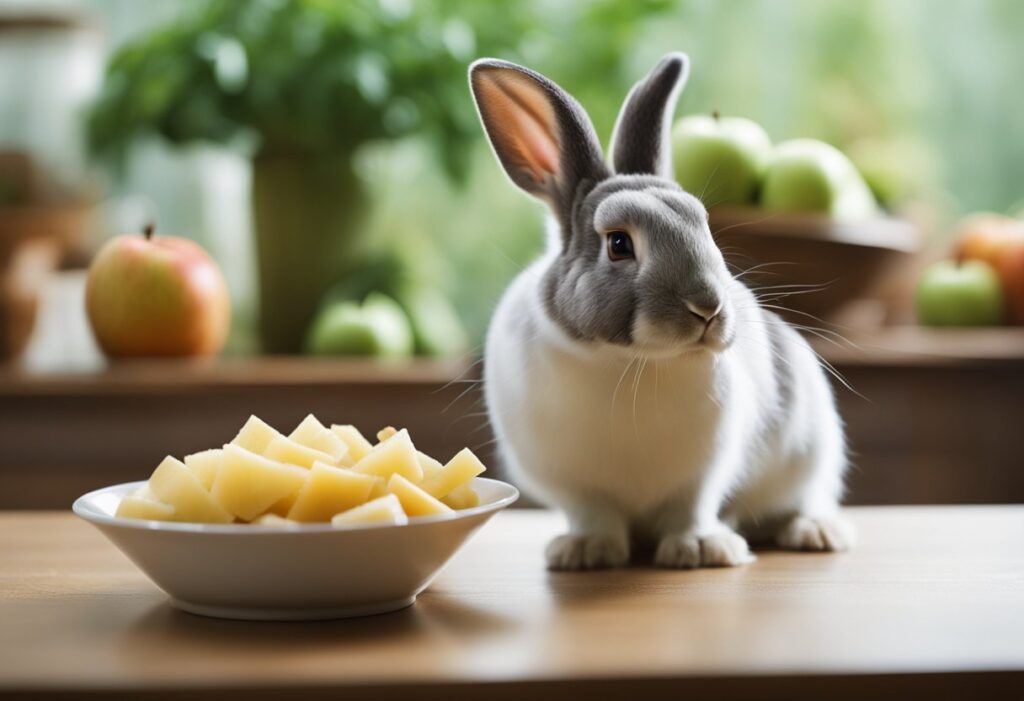
When it comes to feeding our furry friends, we must be careful with what we give them. Rabbits have a delicate digestive system, and certain foods can cause health problems. Applesauce is a common food that we humans enjoy, but is it safe for rabbits to eat? Let’s take a closer look.
Is Applesauce Safe for Bunnies?
The answer is yes and no. Applesauce itself is not toxic to rabbits, but it is not an ideal food for them either. Applesauce is high in sugar, and too much sugar can cause digestive issues in rabbits. Additionally, applesauce often contains additives and preservatives that can be harmful to rabbits.
If you do decide to give your rabbit applesauce, make sure it is in moderation and does not contain any harmful additives. It is best to avoid giving your rabbit applesauce altogether and stick to a diet of hay, fresh vegetables, and a small amount of fruit.
Benefits and Concerns
While applesauce is not recommended for rabbits, apples themselves can be a healthy treat when given in moderation. Apples are a good source of fiber and vitamins, but they should be given sparingly due to their high sugar content. When giving your rabbit apples, make sure to remove the seeds and core, as they can be harmful to rabbits.
In conclusion, while applesauce may seem like a tasty treat for your rabbit, it is best to avoid giving it to them. Stick to a diet of hay, fresh vegetables, and a small amount of fruit to keep your rabbit healthy and happy.
Can Bunnies Eat Applesauce?
As herbivores, rabbits have a unique digestive system that is designed to process high-fiber foods such as hay, fresh vegetables, and fruits. While apples are generally considered safe for rabbits to eat in small amounts, the question remains: can bunnies eat applesauce?
The short answer is that it’s not recommended to feed applesauce to rabbits. Here’s why:
- High sugar content: Applesauce often contains added sugar, which can be harmful to rabbits. Rabbits have a sensitive digestive system and consuming too much sugar can cause digestive issues such as diarrhea and bloating.
- Lack of fiber: Applesauce is a processed food that lacks the fiber that is essential for a rabbit’s digestive health. A diet that is low in fiber can lead to serious health problems such as gastrointestinal stasis.
- Risk of choking: Applesauce is a thick, sticky food that can easily get stuck in a rabbit’s throat, causing choking and other health issues.
Overall, while it may be tempting to give your bunny a taste of applesauce, it’s best to stick with fresh fruits and vegetables that are safe for rabbits to eat. If you’re unsure about what foods are safe for your bunny, consult with a veterinarian or a rabbit-savvy nutritionist to ensure that your furry friend is getting the proper nutrition they need to thrive.
Can Bunnies Eat Unsweetened Applesauce
As herbivores, bunnies can eat a variety of fruits in moderation, including applesauce. However, it is important to note that not all types of applesauce are safe for bunnies to consume.
Unsweetened applesauce is a healthier option for bunnies as it does not contain added sugars or preservatives. It is also lower in calories compared to sweetened applesauce, which can help prevent obesity and other health issues in bunnies.
When feeding your bunny unsweetened applesauce, it is important to do so in moderation. Too much applesauce can lead to digestive issues and diarrhea. As with any new food, it is recommended to introduce unsweetened applesauce gradually and in small amounts to monitor your bunny’s reaction.
In summary, bunnies can eat unsweetened applesauce as a treat in moderation. However, it should not be a staple in their diet and should be given in small amounts to avoid digestive issues.
Feeding Guidelines
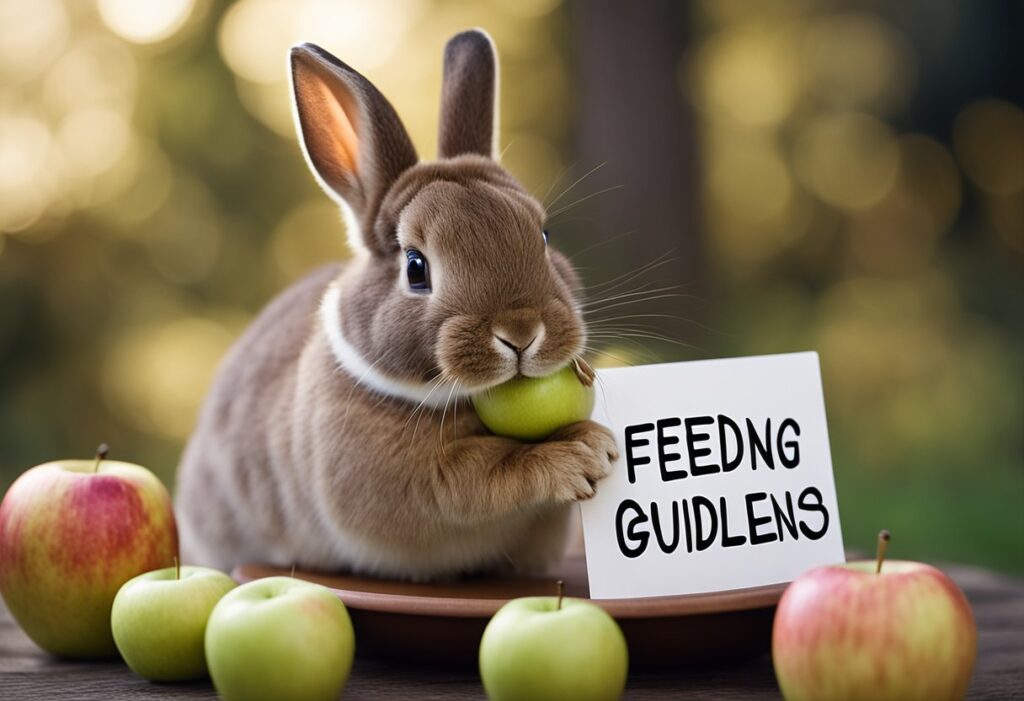
How to Introduce Applesauce
When introducing applesauce to your bunny’s diet, it is important to start with a small amount and gradually increase the serving size over time. This allows your bunny’s digestive system to adjust to the new food and helps prevent any potential digestive issues.
We recommend mixing a small amount of applesauce with your bunny’s regular food to start. If your bunny shows no signs of digestive upset, you can gradually increase the amount of applesauce over the course of a few days.
It is important to monitor your bunny’s behavior and stool consistency during this process. If you notice any changes, such as diarrhea or decreased appetite, it may be necessary to decrease the amount of applesauce or discontinue feeding it altogether.
Appropriate Serving Sizes
When feeding applesauce to your bunny, it is important to keep serving sizes small and infrequent. Applesauce should not be a regular part of your bunny’s diet, but rather an occasional treat.
We recommend serving no more than 1-2 teaspoons of applesauce per day, and no more than 2-3 times per week. This helps prevent overfeeding and ensures that your bunny’s diet remains balanced and healthy.
It is also important to choose unsweetened applesauce, as added sugars and preservatives can be harmful to your bunny’s health. Additionally, be sure to avoid applesauce with added spices or flavorings, as these can also be harmful to your bunny’s digestive system.
Overall, applesauce can be a safe and enjoyable treat for your bunny when fed in moderation and with caution. By following these feeding guidelines, you can help ensure that your bunny stays healthy and happy.
Healthier Alternatives
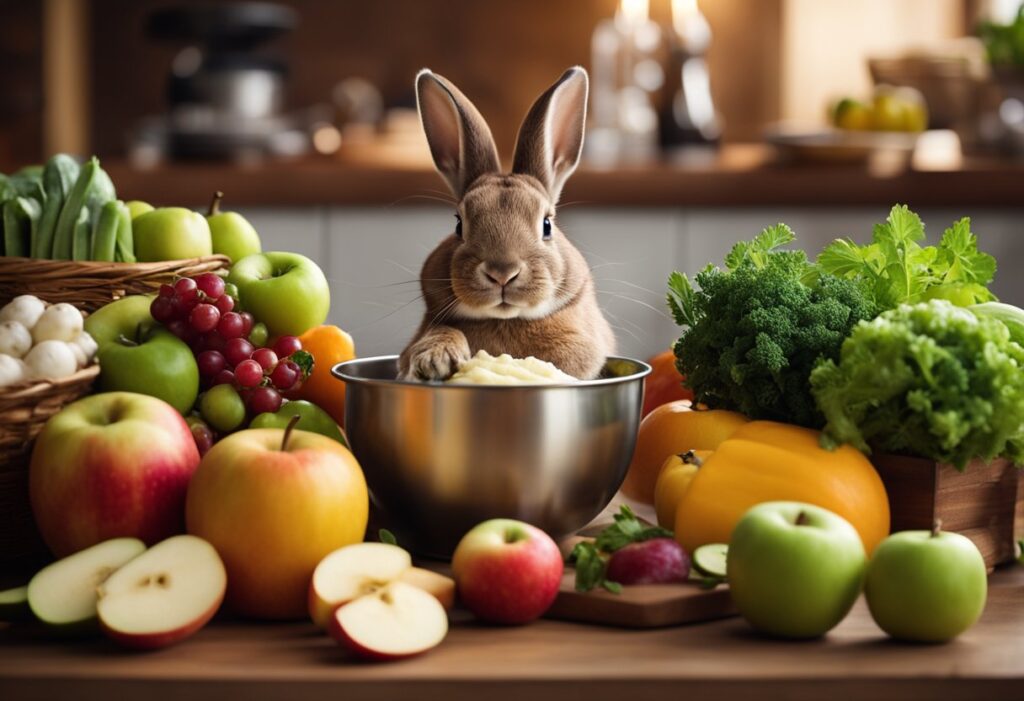
When it comes to feeding our bunnies, we want to make sure we’re providing them with the best possible nutrition. While applesauce may seem like a tasty treat, it’s important to remember that it’s high in sugar and not the best choice for our furry friends. Luckily, there are plenty of healthier alternatives that we can offer them.
Fresh Fruit Options
If you’re looking for a sweet treat to give your bunny, fresh fruit is a great option. While fruit should still be given in moderation, it contains natural sugars that are healthier for our bunnies than processed sugars. Some great fruit options for bunnies include:
- Apples (without the seeds)
- Bananas
- Blueberries
- Papaya
- Pineapple
Remember to always wash the fruit thoroughly and remove any seeds or pits before giving it to your bunny.
Vegetable Snacks for Bunnies
Vegetables are an important part of a bunny’s diet, and they can make great snacks as well. Some veggies that bunnies love include:
- Carrots
- Broccoli
- Celery
- Cucumber
- Kale
It’s important to remember that some vegetables, like carrots, are high in sugar and should be given in moderation. Always wash your veggies thoroughly before giving them to your bunny.
By offering our bunnies healthier alternatives to sugary treats like applesauce, we can help ensure that they’re getting the nutrition they need to stay healthy and happy.
Frequently Asked Questions

What are the potential risks of feeding applesauce to rabbits?
Feeding applesauce to rabbits can be risky as it contains added sugars and preservatives which are not suitable for their digestive system. Rabbits have a sensitive digestive system and feeding them food items that they are not used to can lead to digestive issues such as diarrhea, bloating, and gas.
How does cinnamon affect a rabbit’s health?
Cinnamon is not toxic to rabbits but it can cause digestive issues if fed in large quantities. It is recommended to avoid feeding cinnamon to rabbits as it can lead to stomach upset and diarrhea.
Is ascorbic acid safe for rabbit consumption?
Ascorbic acid, also known as vitamin C, is safe for rabbit consumption in moderation. However, rabbits can produce their own vitamin C, so it is not necessary to supplement their diet with it. Over-supplementation of vitamin C can lead to health issues such as bladder stones and diarrhea.
Can rabbits eat fresh apples without any adverse effects?
Fresh apples can be fed to rabbits in moderation as they contain natural sugars and fiber which can be beneficial for their digestive system. However, it is important to remove the seeds and core as they can be toxic to rabbits.
What types of fruit should be avoided in a rabbit’s diet?
Fruits that are high in sugar content such as grapes, cherries, and bananas should be avoided in a rabbit’s diet. Additionally, fruits that have high levels of oxalic acid such as rhubarb and spinach should also be avoided.
Is apple-flavored baby food appropriate for rabbits?
Apple-flavored baby food may contain added sugars and preservatives which are not suitable for a rabbit’s digestive system. It is recommended to avoid feeding baby food to rabbits and instead stick to fresh fruits and vegetables.

